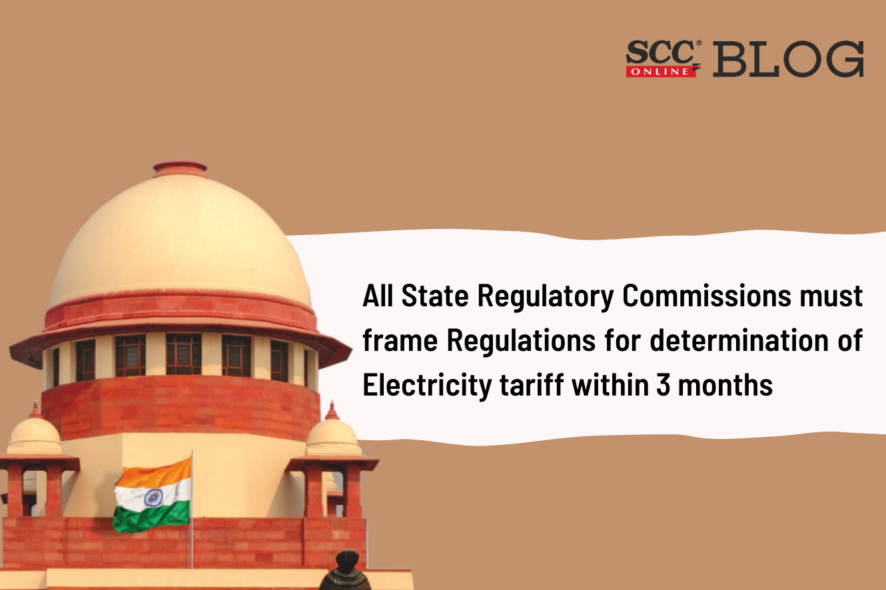Supreme Court: The 3-judge bench of Dr DY Chandrachud, CJI* and AS Bopanna and JB Pardiwala, JJ has directed all State Regulatory Commissions to frame Regulations under Section 181 of Electricity Act, 2003 on the terms and conditions for determination of tariff within three months after holding that the provisions of the Act do not prescribe one dominant method to determine tariff as it seeks to distance the State Governments from the determination and regulation of tariff, placing such power completely within the ambit of the Appropriate Commissions.
The Court observed that though the Government, both at the Centre and in the States, have framed statutory policies and guidelines regulating the electricity sector, the Regulatory Commissions have not framed the necessary regulations to put into effect the principles prescribed under the Act.
The Court directed that,
- While framing these guidelines on determination of tariff, the Appropriate Commission shall be guided by the principles prescribed in Section 61, which also includes the NEP and NTP, aiming to effectuate a balance that would create a sustainable model of electricity regulation in the States.
- The Regulatory Commission shall curate to the specific needs of the State while framing these regulations. Further, the regulations framed must be in consonance with the objective of the Electricity Act, 2003, which is to enhance the investment of private stakeholders in the electricity regulatory sector so as to create a sustainable and effective system of tariff determination that is cost efficient so that such benefits percolate to the end consumers.
- Where the Appropriate Commission(s) has already framed regulations, they shall be amended to include provisions on the criteria for choosing the modalities to determine the tariff, in case they have not been already included.
Explaining the scheme of the Electricity Act, 2003, the Court observed that Sections 62 and 63 stipulate the modalities of tariff determination. While Section 62 bestows the Commission with wide discretion to determine tariff, Section 63 seeks to curtail this discretion where a bidding process for tariff determination has already been conducted. Section 63 contemplates that in such situations where the tariff has been determined through the bidding process, the Commission cannot by falling back on the discretion provided under Section 62 negate the tariff determined through bidding. This interpretation of Section 63 is fortified by the use of the phrase ‘such’ in Section 63 – the Commission is bound to ‘adopt’ ‘such’ tariff determined through bidding.
Explaining the features of Section 63, the Court observed:
- Section 63 begins with a non-obstante clause. The non-obstante provision overrides Section 62 alone and not all the provisions of the Act;
- as opposed to Section 62 where the Commission is granted the power to determine the tariff, under the Section 63 route, the bidding process determines the tariff;
- the Commission is mandated to adopt such tariff that is determined by the bidding process;
- the Commission has the discretion to not adopt the tariff determined through the bidding process only if the twin conditions as mentioned in the provision are not fulfilled; and
- the twin conditions are that (a) the bidding process must have been transparent; (b) the bidding process must have complied with the guidelines issued by the Central Government.
The Court stressed that the non-obstante clause in Section 63 cannot be interpreted to mean that Section 63 would take precedence over Section 62 at the stage of choosing the modality to determine tariff. The criteria or guidelines for the determination of the modality of tariff determination ought to be notified by the Appropriate State Commission either through regulations under Section 181 of the Act or guidelines under Section 61 of the Act.
“There is nothing in Sections 62 or 63 that could lead us to interpret that Section 63 is the dominant route for determination of tariff. Both the provisions provide alternative modalities through which tariff can be determined.”
[TATA Power Company Limited Transmission v. Maharashtra Electricity Regulatory Commission, 2022 SCC OnLine SC 1615, decided on 23.11.2022]
*Judgment by: CJI Dr DY Chandrachud
For appellants: Sr Adv Shyam Divan
For respondent: Sr Advs Dr Abhishek Manu Singhvi and Vikas Singh







